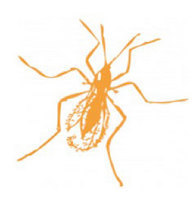Published: June 13, 2013 Authors: Sarah Craig and Marissa Gebhard

The Eck Institute for Global Health is hosting the 2013 Arthropod Genomics Symposium and VectorBase Workshop Wednesday-Saturday (June 12-15) at McKenna Hall at the University of Notre Dame.
More than 225 researchers from around the globe will gather to discuss current and future research. The researchers who are presenting are at the forefront of genomic approaches to arthropods, both model organisms and those of agricultural or health relevance. Some will share methods for developing tools for genomic analysis. The symposium will be broken into sessions including emerging genomes, epigenomics, systems biology/population genomics and ecological genomics/metagenomics. The event includes a vendor fair and two poster sessions where more than 125 posters will be presented.
The event includes a hands-on VectorBase Workshop. VectorBase is a bioinformatics resource center focused on invertebrate vectors of human disease. It currently hosts 13 vector genomes, all of which are associated with well-established and characterized laboratory colonies. The workshop offers training and data analysis opportunities. Through hands-on practical sessions, users can discuss their own data sets with the instructors and fellow attendees.
The symposium commences with the John A. Lynch Lecture Series keynote speaker Serap Aksoy, professor of epidemiology at Yale University, who will give a presentation titled, “Unleashing the tsetse genomic: Are there magic bullets for trypanosomiasis control?” The lecture series is named after John A. Lynch, M.D., a 1951 Notre Dame alumnus who founded Kansas Orthopedics & Sports Medicine.
The Eck Institute for Global Health is a University-wide enterprise that recognizes health as a fundamental human right and endeavors to promote research, training and service to advance health standards for all people, especially people in low- and middle-income countries, who are disproportionately impacted by preventable diseases.